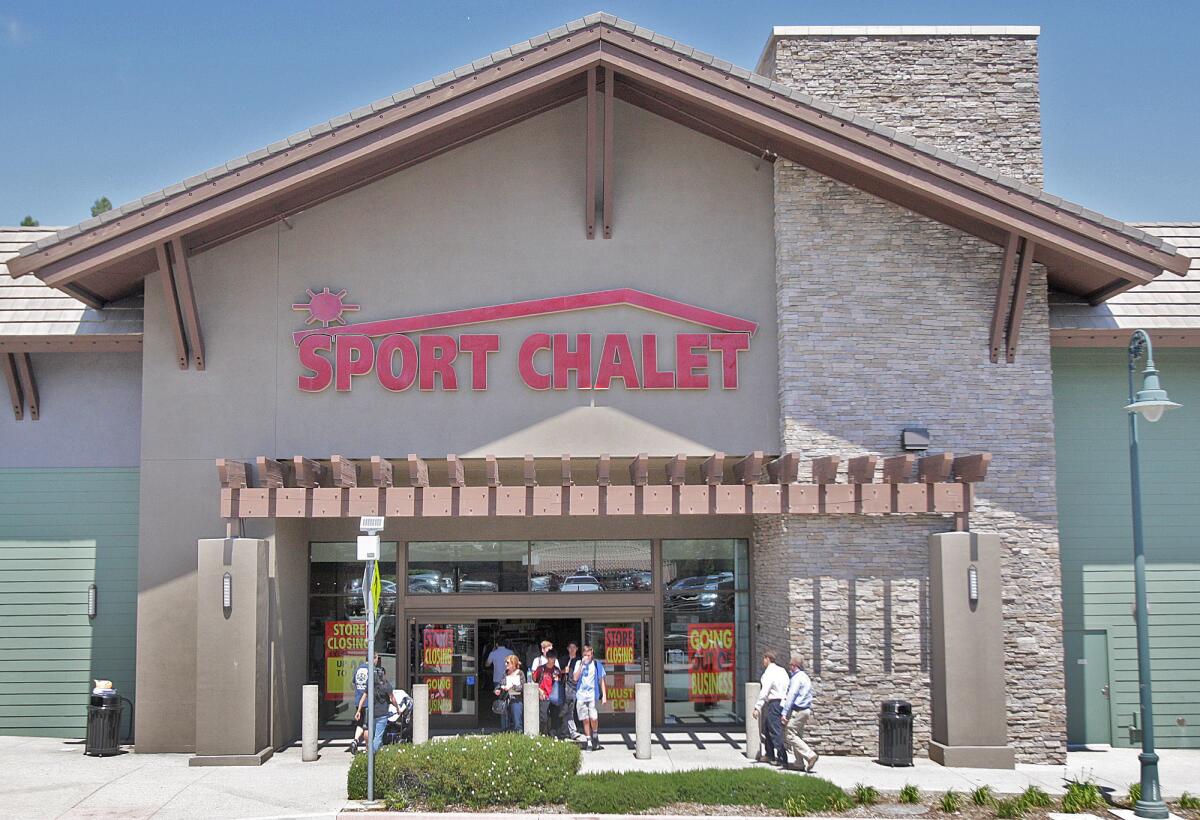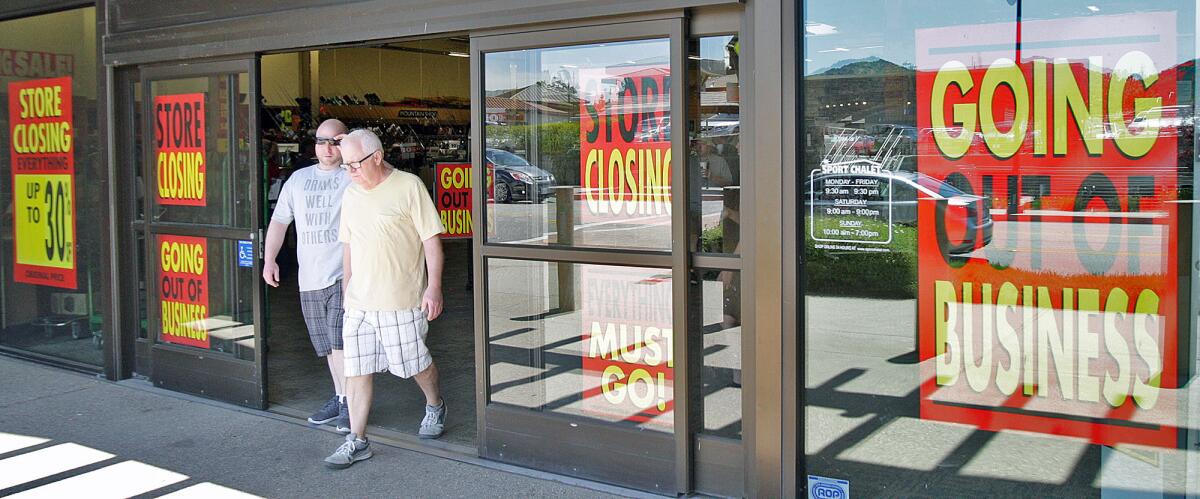End of the game for Sport Chalet

People take advantage of up to 30% off all merchandise at Sport Chalet in La Cañada Flintridge on Tuesday, April 19, 2016.
Employees of Sport Chalet are winding down operations after the store’s parent company announced abruptly Saturday it was ceasing online operations immediately, closing all of its 47 stores and initiating a going-out-of-business sale.
“We’re closing. Thank you for 57 great years,” Sport Chalet told customers in an email message Saturday morning.
NEWSLETTER: Stay up to date with what’s going on in your community >>
The news hit especially close to home in La Cañada Flintridge, the town where Sport Chalet founders Norbert and Irene Olberz first bought a ski and tennis shop on Foothill Boulevard in 1959.
Even as their business expanded into a chain of retail locations and the company’s stock became publicly traded in the 1990s, Sport Chalet headquarters remained in La Cañada until very recently.

Mike Brabham, a ski technician who started working at the family-owned company in 1989, recalled in a recent interview the store’s “glory days,” a time when expertise, hard work and unquestionable customer service predominated.
“There’d be so much work, an overwhelming workload, but we liked it when it was busy. It made us feel wanted and needed,” the Glendale resident remembered. “[Norbert] was a very tough guy to work for, because he was a perfectionist. But if you showed him you really wanted to work, and put everything into it and did your best, he’d treat you fairly.”
For years, employees like Brabham enjoyed the benefits of working at a solid company where morale was high and relationships with customers and colleagues were long-lasting. When staff members learned in 1992 that Sport Chalet was transitioning into a publicly traded company, hopes were high and several employees bought shares in the company stock.
Hearing this, yes, it was a shocker, but I guess it wasn’t to be unexpected.
— Mike Brabham, ski technician at Sport Chalet
Today, Brabham looks back on that transition as “the beginning of the beginning of the end,” which would later be followed by Olberz stepping down from the company’s board of directors in 2001 and the store’s relocation in 2008 to a 45,000-square-foot space in La Cañada’s newly built Town Center.
“It was kind of obvious from that point on [Sport] Chalet was starting to lose its old soul, that it had when Norbert was running the business,” Brabham recalled. “Profit was everything and, eventually, things deteriorated.”
On Friday, the day before Sport Chalet customers received the news by email, Brabham said store employees were unceremoniously notified of the store’s closure.
“The managers had a little pow-wow and said, ‘We’re done. We’re going out of business,’” the ski technician said Monday. “Hearing this, yes, it was a shocker, but I guess it wasn’t to be unexpected.”
In its announcement Saturday to customers, Sport Chalet said it would continue to honor gift cards and loyalty rewards, but an internal memo obtained by the Los Angeles Times set a cutoff date of April 29. No closing date for the stores was given; the memo said “several weeks.”
Sport Chalet’s parent company, Vestis Retail Group, said Monday that it had filed for Chapter 11 bankruptcy protection.
Connecticut-based Vestis also owns outdoor clothing and gear chain Eastern Mountain Sports and East Coast family apparel and shoe retailer Bob’s Stores.

Two men exit Sport Chalet in La Cañada Flintridge on Tuesday, April 19, 2016. Sport Chalet’s parent company, Vestis Retail Group, said Monday that it had filed for Chapter 11 bankruptcy protection.
In a statement, Vestis said it made “significant progress” in stabilizing Eastern Mountain Sports and Sport Chalet since it acquired the businesses in 2012 and 2014, respectively. It said overall performance improved at all three brands.
“As a result, EMS and Bob’s are now delivering solid performance but have been burdened by limited financial flexibility due, in part, to the unique competitive pressures facing Sport Chalet,” Vestis Chief Executive Mark Walsh said in a statement. “After reviewing a variety of strategic alternatives, we determined that the best path forward is to separate the businesses and confront the challenges that have been hindering our overall progress.”
Vestis said it proposed that Eastern Mountain Sports and Bob’s Stores be sold to funds advised by Philadelphia-based Versa Capital Management, a private equity firm that owns Vestis.
The agreement with Versa will be subject to court approval. Vestis said that it expects to complete the sale in midsummer before the back-to-school season and that it will “efficiently” wind down Sport Chalet.
The chain has 40 stores in California, mainly in the Southland, according to the website. It also operates five stores in Arizona and two in Las Vegas. The company didn’t say how many people would be losing their jobs, but as of March 30, 2014, the chain employed 1,200 full-time workers and 1,600 part-timers.
Analysts said there were parallels between Sport Chalet and its beleaguered rival Sports Authority, including that both were saddled with debt after being acquired by other firms.
“If a retailer’s got a lot of debt, it means they’re not spending money on stores, they’re not spending money on systems, they’re not spending money on the kinds of things they need to do to drive the business forward,” said Matt Powell, an industry analyst at market research firm NPD Group.
Join the conversation on Facebook >>
Although Sport Chalet once marketed itself as being staffed by “the experts,” that customer help for specific activities has been matched by several of its rivals, said Rory Masterson, industry analyst at IBISWorld.
“The big problem was that they weren’t focused on anything enough to carve a niche in the market,” Masterson said.
And outdoor blogs and online reviews have also made in-store specialists less of a selling point.
Sport Chalet was known for catering to enthusiasts in winter sports, diving, marathon running and hiking, but ultimately it wasn’t enough.
In its fiscal year ended March 30, 2014, its last as a public company, Sport Chalet lost $10 million on sales of $344 million. Dick’s, with 645 stores, had sales of $7.3 billion in its fiscal year ended Jan. 30.
Dick’s and other industry leaders such as REI and Cabela’s Inc. also established stronger relationships with suppliers and developed the kind of leverage on the supply side that smaller operators like Sport Chalet were unable to match, Masterson said.
Those retailers were also ahead of the curve when it came to building an online presence, which put Sport Chalet at a disadvantage, he said.
Local officials consider effect of the store’s closure
Now, in the final weeks of the store’s 57-year life span, La Cañada Flintridge city officials and members of the business community are trying to ascertain what the city stands to lose in property and sales taxes, business licensing fees and the secondary commerce created by employees and customers shopping and dining in town.
Dan Jordan, the city’s director of finance, said City Manager Mark Alexander is reaching out to the county’s tax assessor’s office to get a clear picture of how much Sport Chalet bolstered the local economy. Jordan indicated Sport Chalet paid upward of $1,000 annually to maintain its business license, which reports 195 retail employees worked there, but said the exact loss will be hard to quantify.
“It’s not a small event in the history of the city, there’s no question about that,” he said.
In a statement issued Monday, Alexander said he was unable to disclose certain financial information, such as Sport Chalet’s sales-tax generation. He called news of the closure “heartbreaking” but indicated the city’s finances will ultimately be able to weather the company’s absence.
“I can say the city is in a sufficiently secure financial position [where] the store’s closure will not have a significant negative impact on the city’s budget,” he said.
Pat Anderson, president and chief executive of the local chamber of commerce, said city officials have reached out to IDS Real Estate Group, which owns the La Cañada Town Center, to ensure a replacement business can be found. Anderson said she plans to work diligently to communicate with IDS representatives so that an appropriate enterprise can be identified as quickly as possible.
In the meantime, she said, community members will have to grieve the loss of a business that, over more than five decades, had become a local icon and an important member of the La Cañada family.
Brabham offered his own post mortem on the company he watched evolve, and devolve, during his 27 years of employment there.
“I personally think it was mismanagement and corporate greed — that was what killed Sport Chalet,” he said.
Los Angeles Times writers James F. Peltz, Samantha Masunaga, Nancy Rivera Brooks and Dan Weikel contributed to this story.
--
Sara Cardine, sara.cardine@latimes.com
Twitter: @SaraCardine
--
ALSO:
Man charged with killing his nephews in Arcadia is extradited from Hong Kong
Concept design for Hill Street Café gets greenlight from city commission
